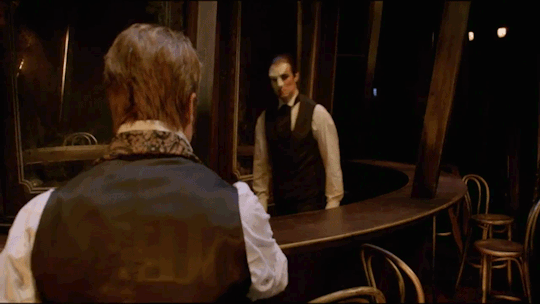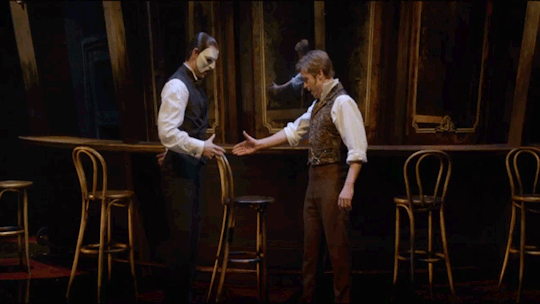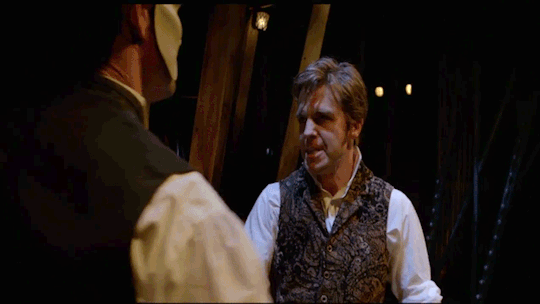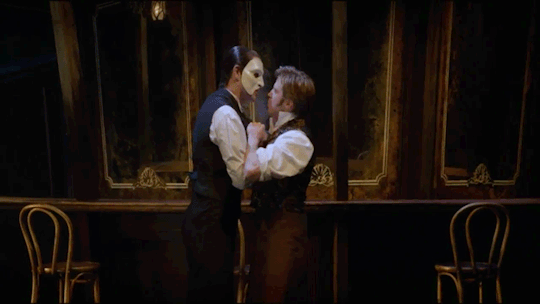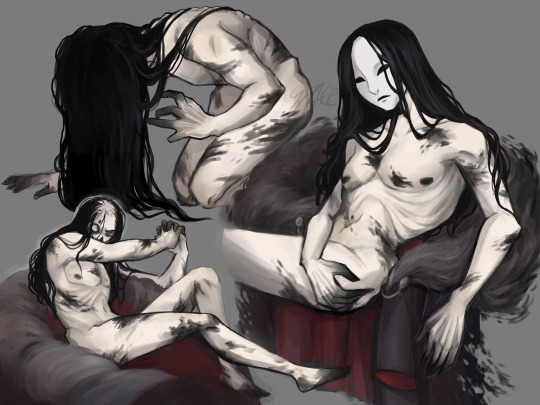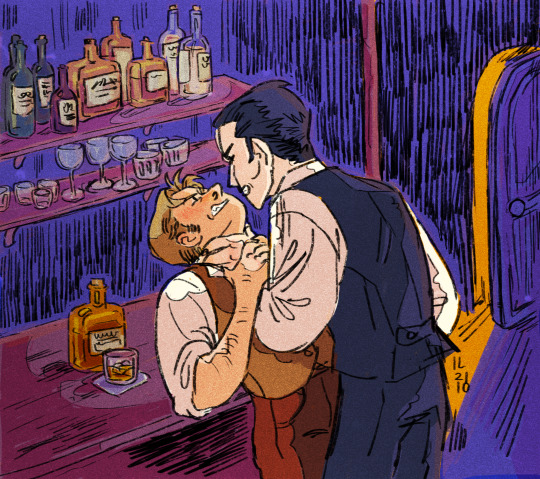Text
Hyde painting‼️ (Jekyll and Hyde musical version!!)
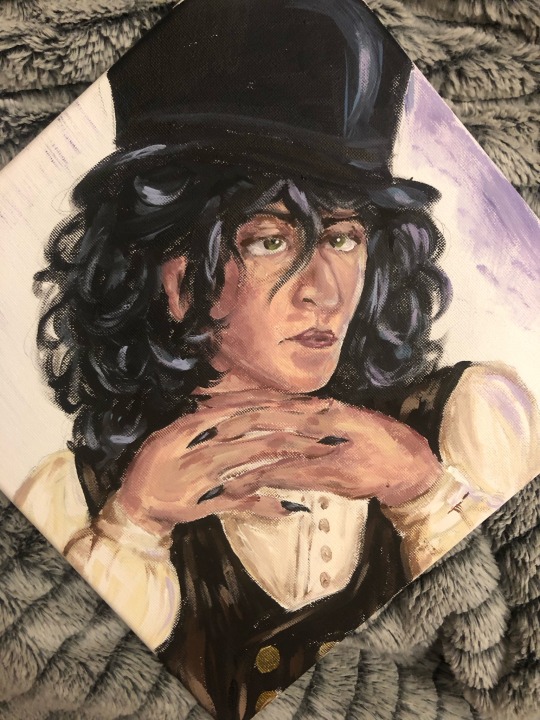
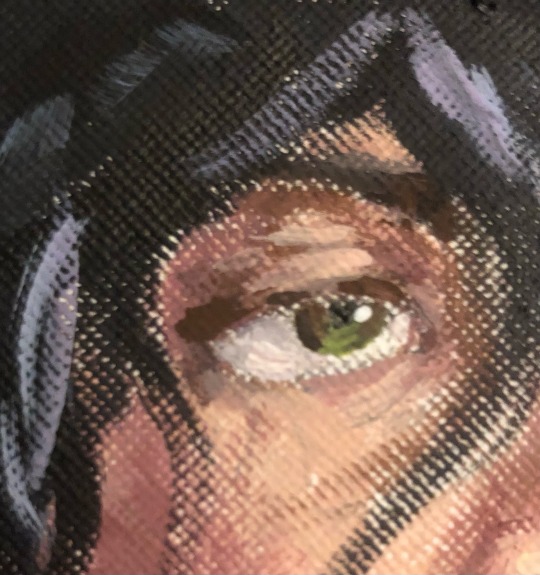
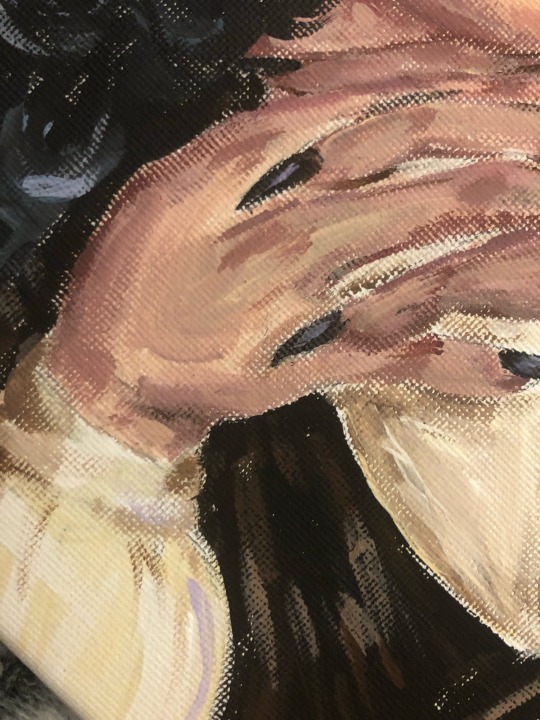
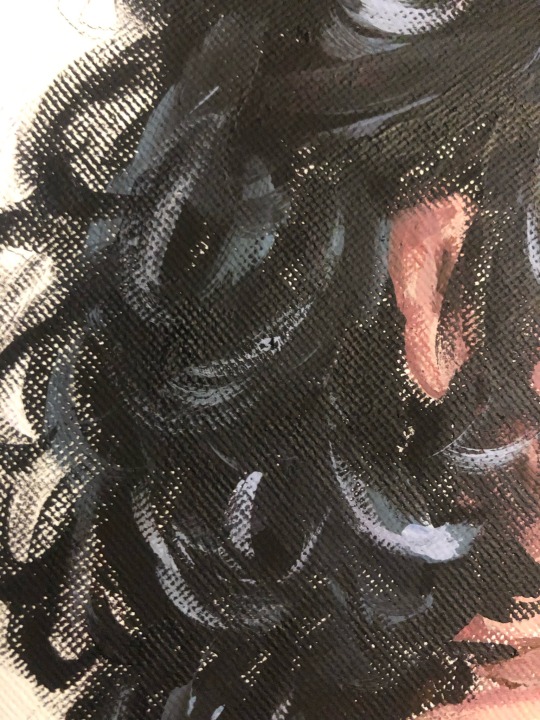
114 notes
·
View notes
Note
Hey, the invite to your server seems to have expired!
Oh, that's odd! Here's the new link if you're interested <:3
0 notes
Text
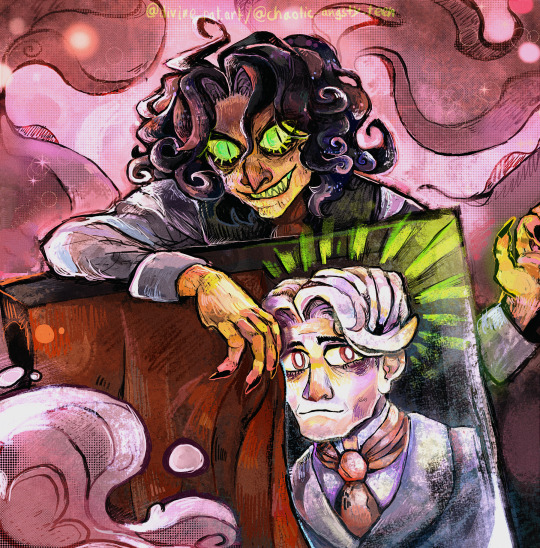
My entry for @atheraetherius 's DTIYS on Instagram! I struggled a lot with the background but I really wanted to make it weird so I'm more or less satisfied.
611 notes
·
View notes
Note
Here's one I pondered this morning because My flashbacks began for myself, How did you first encounter Jekyll and Hyde? Did you encounter it before you got into it?
There's this one roleplay server which I then left, where people used to muse a fair amount of characters from gothic literature; although the person who mused Hyde there barely had any media literacy or understanding of the character (and copied a lot of my old Hyde design, which quite frankly I don't mind, the reason it is scrapped was because it heavily mischaracterized my Jekyll. The dude's also a gatekeeper of that breed and I don't FW gatekeepers, so he can kindly cry to his momma if he ever reads this), the concept of evil incarnate somewhat fascinated me, and I currently had my brain literally filled with dust, so I was looking for something which I could obsess over. I read The Glass Scientists first, then watched the musical, then watched the MAZM gameplay and then skimmed the novella. I didn't read Jekyll or Lanyon's statements, shit's too boring.
3 notes
·
View notes
Text
Edward Hyde would be an absolute menace on social media you cannot convince me otherwise
152 notes
·
View notes
Note
y’know, I somewhat recall you saying you had your own J&H adaptation, Any fun facts about it itself or J&H? (You give me asks I’ll give you one right back)
Hello, although I only have the 0,1% completed which is like, a summary of eight/nine months of work, I am still very excited to share my little alternative universe; it takes inspiration from many other adaptations, mainly the musical and The Glass Scientists. A lot of things are placeholders for something bigger and completely original, and it's supposed to blend with actual history, meaning that in some way it is historically accurate at some extent, considering I am making extensive researches about the Victorian Era and how it works, with the help of books and articles online. It's quite hard to make it 100% accurate of course, but most Jekyll and Hyde adaptations tend to ignore the fact that this is set in a very specific period of time, and they also tend to focus more on which character sucks the most dicks rather than the original message(s) of the novella. I don't like stories which solely focus on the characters being queer and that's clear, and while LGBTQ+ is included in Apotheosis, that doesn't mean that its the main focus; sure, it is talked about, but it's a part of the story and not the main story. I'm not saying that there should be a correct way of writing adaptations, but rather, that the world should feel alive and dynamic. It is important to establish worldbuilding, and make it a present part of the story, because it SHAPES the characters. I think that whilst you do not need a degree in history to write about J&H or the victorian era, it's important to know at least the basics of how the society worked, the advancements and how they affected society, etc.
Now, the victorian era is quite interesting when it comes to progress. In 1879 the first psychology laboratory was established in Germany, and many other advances in medicine were made, there were the first feminist movements, the two industrial revolutions (second in 1870-1914), what I'm trying to say is that the 19th century is a very important period of our time, at least for eurocentric history, and it's so curious to think how some of these inventions are just two centuries old. Not to mention that by 1888, the Bloody Code (which was how the severe law system of England was called, which focused on social punishment rather than rehabilitation, and the death penalty was very common even for lesser crimes by public execution) had been largely replaced and the death penalty wasn't in use anymore. The world was changing and advancing, and what does that mean for the most conservative classes, especially those who were in high favor to such horrible practices, especially when towards the lower and most despised classes? What does it mean for the poor and ostracized, especially considering the precarious conditions of orphanages, poorhouses and such? Fun fact: this was one of the battles the Crown itself, or rather, Queen Victoria, as a woman and mother, advocated for this, especially when most of its components were children, which were there for various reasons. And what about the emerging middle classes, the so despised noveau nobillty?
Medicine was both revered and feared, because while advancements were made in medical science, many treatments were still primitive and often painful. Additionally, the lack of understanding about germs and proper sanitation led to high mortality rates in hospitals, contributing to a general fear and distrust of medical practices among the public; not to mention that writers were starting to talk about the dangers of medicine (ex. Frankenstein), not to mention that there was the Royal Society that, while it promoted scientific inquiry, knowledge and collaboration, it certainly would've found itself debating about the inclusion of rogue science as effectively, a science.
It is important to know the rest of the hystorical context in which Apotheosis finds itself in, which is that of a very important migration of citizens from Ireland to London (including jews who were fleeing from the pogroms, popular riots against religious minorities which were happening in the Russian Empire), and all of them gathered in the East End of London, where Whitechapel was. It didn't take long for overpopulation (which was already a recurring issue in London) to happen, and for Whitechapel to be redeemed a generally unsafe place like all the other slums, not to mention all the popular disorders and the increase of violent repression from the London Metropolitan Police (ex. Bloody Sunday, which caused at least two deaths, it was basically a manifestation in which the Social Democratic Federation advocated for the end of unemployment, better working conditions and a right to vote for all adult men, other than supporting the Irish National League against the oppression the british were putting them through); it's in this context, that from august-november of 1888, Jack the Ripper terrifies London; 16 are the suspected victims, 5 the ones which had been confirmed, but what if I told you that there is actually more to this tale, when people thought that the Ripper was still amongst them due to how ineffective the police system was at the time, and that some murders associated with him weren't actually the Ripper's doing?
General Lord Glossop, a member of the council which oversees the Royal Society, was found dead after attending the funeral of His Grace, the Bishop of Basingstoke. The body was found the next morning, January 1889; the method of killing appeared to be strangulation as confirmed by trained medical professionals. This was the second governor who happened to die under mysterious circumstances which, were associated with the Ripper itself, as the methods were basically the same. On December 1888, the body of an unidentified underage prostitute and the terribly mutilated corpse of His Grace, the Bishop of Basingstoke, were found in the streets of a London slum, following the same criteria of that which seemed to reflect that of Jack the Ripper.
A member of the Marchetti family, Miss. Maia Marchetti, requested an immediate revision of the autopsies to prove that the killer wasn't Jack The Ripper, but rather another unnamed man who yet had to be caught; she founded her thesis on the two, crucial facts that the murderer had only ever killed members of the aristocracy and one single prostitute for the sole fact that she could've potentially acted as a witness for the case, and there wasn't any fury exhibited towards her corpse, and Thomas Bond (profilier of Jack The Ripper) stated that the Ripper didn't have any anatomical knowledge, and the body appeared to have been mutilated with such a precision which could only belong to those with a great anatomical knowledge, possibly a doctor.
On another note, she had managed to gather ten prostitutes together, who worked in the same zones where the homicides happened, to declare in a written letter to Scotland Yard, that an unknown, violent and unpleasant man with an odd fascination with sadomasochism, had been with them. However, this request was denied, and the letter archieved, until the inspector on the case Scott Newcomen presented the same thesis, thus obtaining a revised autopsy report, this time conducted by Dr. Hastie Lanyon, who brought some interesting discoveries to the table. It is important to note to the case that, the two men had died because of a basilar skull fracture, while the prostitute seemed to truly have died because of strangulation, like it had already been ascertained.
Due to the sheer brutality of the murders and the fact that they involved members of the aristocracy, the media was following this case with great attention, and reporting on it extensively (and of course great pressure was put on the authorities to solve the crimes quickly). Considering that this man happened to principally target members of the upper classes who had a significant role in society, save if there were any eye-witnesses, speculations that these might be murders made for socio-politic reasons committed by a member of the lower classes, seeing the location and circumstances, caused heightened tensions between social classes.
Other members of the council, such as Lady Beaconsfield and Sir Archibald Proops, perished under the same circumstances. An interesting parallelism is that many unreliable letters were sent to Scotland Yard and to Central News Agency; some were written by well-intentioned citizens, providing information towards the capture of the killer; however, the majority of them were deemed useless and consequently ignored. Hundreds of letters were written by people claiming to be the killer, and although this letter wasn't redeemed important and considered a fake, and consequently scrapped, a letter had been signed with the name Edward Hyde. And that's how people started to identify the man. Another letter described the man as someone who had a rancid aura around him, with an area of deformity which couldn't be quite explained by any actual malformations; he had long, golden locks. And unfortunately, these were the only small details which also happened to have been confirmed in the first letters those ten prostitutes wrote. A first rough identi-kit and criminal profile was made by Dr. Hastie Lanyon.
The slayings were the handiwork of a solitary individual, a robust young man aged between eighteen and twenty-three, possessed of a brazen yet unflappable demeanor, bearing obscure physical anomalies difficult to discern. Though yet too youthful to grace the circles of high society, Edward Hyde presented himself in attire befitting a gentleman of esteem, maintaining habitual visits to dens of iniquity, whilst displaying a remarkable acumen in matters anatomical, suggestive of a scholarly pursuit, perhaps that of the medical sciences.
The fact that it was clearly a member of the aristocracy seemingly fell deaf to the ears of the media, which constantly sidetracked the police investigations, misleading them and accusing innocents of being Edward Hyde and fabricating evidence with the excuse of pursuing justice, when in reality this just caused more social disadvantages and disorders which ended with popular uprisings; an interesting phenomenon to note, is that of many women sent romantic letters to those who were suspected to be Edward Hyde, and many visited the locations in which the murders happened in hopes of meeting the Prince of Disaster.
22 notes
·
View notes
Note
saying hello to my Mutual, hello mutual
Hello!!
2 notes
·
View notes
Text
Reblog if I can go on your page and write stupid things in your ask box whenever I'd like to.
615K notes
·
View notes
Photo

Next up some more…questionable content (just kidding :P) by my other really good friend deathmchandsome I defiantly suggest checking out their art because its incredible! (Based mainly on the 2004 movie ending…you know exactly why.)
333 notes
·
View notes
Text
Reblog if you're bored and you want anons.

Or non-anons. Whatever works for you!
7K notes
·
View notes
Note
*Cracks knuckles*
Did you really think I wouldn't RETURN THE FAVOR- now, what's YOUR favorite Jekyll and Hyde adaptation(Or adaptations)?
Hello, first off thank you so much for this ask! <3 I don't get them everyday, so I'm very happy with how much this blog is growing, little by little.
My top three is quite controversial, but I'd say that my favorite adaptation so far has to be the broadway musical, from which my own adaptation (Apotheosis) takes inspiration; what people don't understand is that an adaptation isn't made to be 1:1 with the original product, especially when the original quite literally doesn't have anything to tell story-wise and is overall a mediocre story with an interesting concept. Don't get me wrong, I really enjoy the Novella, but I take it for what it is instead of pretending that my interpretation is 100% correct and canon and treating the book as if it were a masterpiece of classic literature, when it isn't— sure, it's a small, enjoyable story which can be interpreted however you want and that's also what makes it appealing to most people— the uncertainity of everything, the fact that we don't know who the reliable narrator is, it's VERY interesting, but it isn't the writing that makes the story, to me. So you see, my disdain for novella fans not only comes from the fact that they're gatekeeping assholes, but also that they insist that their interpretation is the only correct one, when the novella was written PRECISELY to don't have a correct interpretation, at least IMO.
Funniest thing is that they expect Hyde to be a bachelor of morality somehow and not do anything problematic besides murder, because we are so desenitized to violence that apparently now it's something inherently normal (or rather just fandom puritan bullshit), as if this wasn't the literal Victorian Era and the author wasn't a rampaging racist (which is normal for again, the period we find ourselves in. But they are willing to shit on people who attempt to be historically accurate, but when you mention that the dead man they have a parasocial relationship with was racist, and that the original book description of Hyde was IIRC, xenophobic too, they suddenly pull one hundred excuses up from their asses, but only because it's convenient to THEM in that moment).
These people know who I am referring to considering that they "called me out" on their shitty discord server over the 9/11 J&H joke in my description, pfp which was just Christine with a sapphic flag which also makes me presume these people are inherently mysoginistic, and the fact I ship musical Jekyde, sorry for being based I guess. I 100% expect them to see this, and if they do, I have one simple request— get your shit together, you aren't some literary critic, you are like seventeen and a "wrong headcanon" is enough to ruin your day, if not week, fully.
TL;DR Musical takes the first spot, the novella is good albeit mediocre and overrated and its fans are insufferable.
Now, what makes me like the musical if the recorded play wasn't anything special and Hasselhoff's acting atrocious?
The musical was the second adaptation I've watched of J&H, so it's only fair that I am very attached to it, but still recognize its inherent flaws— I don't think however, the musical should be judged because of a bad recording adaptation alone considering the many interpretations we got from other actors (Rob Evans, Robert Cuccioli...) and the simple choreography itself, especially when it was first performed in 1995; all the ideas behind it which in the end didn't make it in the play, are somewhat still there, like Simon Stride basically replacing Lanyon and being an enemy to Jekyll, someone double-faced just like the rest of the governors.
For those who don't know, Stride was supposed to be a main antagonistic figure in the musical, he was the owner of Red Rats and of other several brothels in Kentish Town as stated by Hyde in The Wedding Reception, also described as a green-eyed monster in The Ballad of Dr. Jekyll and Mr. Hyde, the one who performed Good and Evil originally, supposedly when he was collecting money from prostitutes. Since The Spider basically took his role, we also know that Stride is inherently a domestic abuser considering that he hits Lucy on several occasions, other than being Jekyll's contestant for Lisa/Emma as shown in Lisa Carew which literally completely destroys the perception that Lisa completely depends on Jekyll when that's not inherently true. She's underdeveloped yes, but her character is interesting nevertheless, the musical is called JEKYLL AND HYDE, it's normal that it focuses on telling Jekyll's story, because a musical can't be ten hours long. His motivations are inherently unknown, but I suspect that he simply is jealous of Jekyll and overall wanted, like Hyde stated in The Wedding Reception, to put Lisa/Emma in one of his brothels, and he was angry that Jekyll spared her that fate, seemingly.
See? Everything, even if it didn't made it in the final product, it blends in with the background story of the musical's society perfectly, making the world feel alive rather than static like it did in the Novella.
Lisa/Emma is a woman who clearly wants independence, which was something definitely big for the period, considering that the ideal of victorian woman from the conservative classes was that of a frail and submissive lady (which I think it's also seen in the fact that their ideal make up made them look almost as if they were ill due to how pale they were) and the first feminist movements literally simply asked to be beaten up by their husbands less. This is seen in Letting Go and Lisa Carew. She doesn't depend on Jekyll and is stated by her nevertheless, she chose to marry him because she genuinely liked him, and never doubts him even when the big reveal happens. Underdeveloped =/= Bad character.
Lucy, on the other side of the spectrum, is a prostitute, which was the lowest and most hated class you could possibly be a part of. Other than this she's a domestic abuse victim, and the only person who ever considered defending her and showed her kindness, instead of objectifying her even when she was giving him sexual hints, was Jekyll. It's only normal she'd latch onto him; she clearly wants to live a different life and keeps hoping that things will get better for her, because everyone has their day (The Girls of The Night), even when her own best friend (Nellie) discourages her, she keeps hoping. She feels genuinely lost, (Nobody Knows Who I Am) in which it is left implied that she doesn't have anything if not her identity as a prostitute, and that not even her friends (possibly, one of her lines was referred to Nellie) know who she truly is; once, perhaps there were possibilities for her, but that faded because for a prostitute in the victorian era, there's genuinely no hope or respect. Bring on the Men also makes us understand that she's been a prostitute for a very long time now, so who other than she knows this? But yet she keeps hoping, and eventually her prayers get answered. She turns to Jekyll when Hyde first physically harmed her and, she seems very resigned about what has happened to her while Jekyll is horrified, and her emotions led her to kiss him perhaps as a sign of gratitude, and Jekyll didn't refuse, and if I recall correctly that's when Lucy sings Someone Like You and then later on, In His Eyes with Lisa/Emma. If anything, Jekyll is the villain here because he blatantly gave Lucy false hopes, because his actions as Hyde clearly make us perceive that he was only ever kind of her because of lustful reasons, at least IMO. Her world doesn't revolve around Jekyll, we barely see her in the musical quite frankly, and considering what I'm saying and her little screentime, perhaps Lucy is the MOST developed character of the musical. She's tragic— her death truly shows that there wasn't hope for minorities in that society.
Most criticism I saw about the musical is mainly from people who heard things novella fans themselves told which are inherently inaccurate, or from people who perhaps during the songs in let me repeat, A MUSICAL, didn't pay attention.
now, the second spot is taken by Hyde & Seek, I don't have much to say about it because I mainly saw snippets from it but, the motivations are pretty much the same as the musical, the worldbuilding is really good, the characters are funny and memorable, and the art direction is just chefs kiss.
Novella is third.
8 notes
·
View notes

